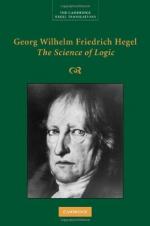|
This section contains 7,493 words (approx. 25 pages at 300 words per page) |

|
SOURCE: Menke, Christoph. “The Dissolution of the Beautiful: Hegel's Theory of Drama.”1 L'Esprit Créateur 35, no. 3 (fall 1995): 19-36.
In the following essay, Menke analyzes Hegel's aesthetics, focusing on his theory of drama and his views about the purpose and ethical dimensions of art.
1. the End of Art in Drama
Hegel's thesis of the end of art says that “art, considered in its highest determination, is a thing of the past for us,” and that, therefore, “it has lost for us genuine truth and life.”2 As Paul De Man points out, this “has usually been interpreted or criticized or, in some rare instances, praised as a historical diagnosis disproven or borne out by history”; hence it has been interpreted as a reference to the historicity of art.3 Accordingly, art belongs in another, a past, historical epoch; only in that epoch “is there [“gibt es”] art as a distinct yet...
|
This section contains 7,493 words (approx. 25 pages at 300 words per page) |

|


